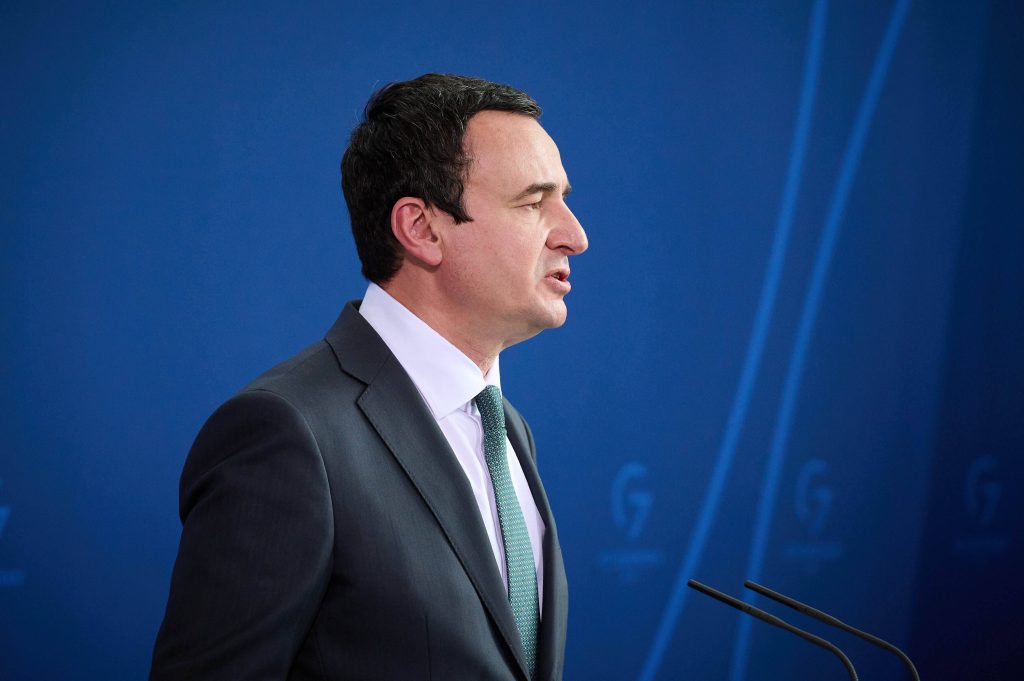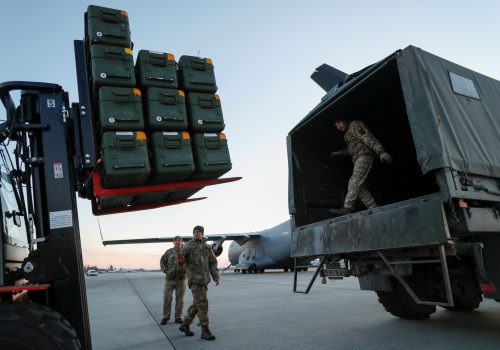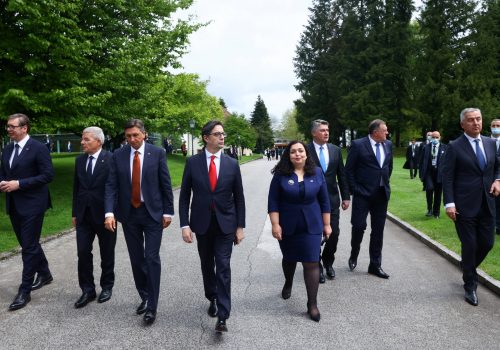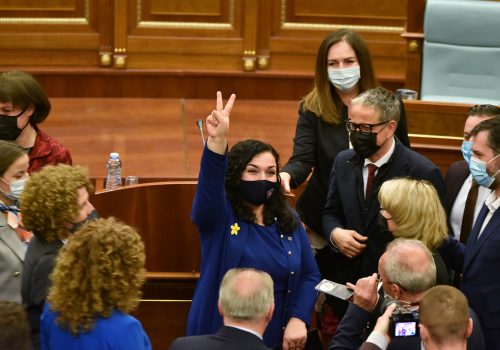With NATO on the verge of a Nordic expansion and the European Union (EU) fast-tracking Ukraine’s application, Russia’s war in Ukraine has reignited discussions about how these institutions can bring about a safer and more secure Europe.
And Kosovo deserves its place in that conversation, says Prime Minister Albin Kurti, whose country is seeking swift membership in both NATO and the EU. “Kosovo is the democratic success story of the region,” Kurti said Wednesday in Washington at an Atlantic Council Front Page event. “Make no mistake: Undoing our progress in Kosovo would be the single greatest victory despotic President [Vladimir] Putin could wish for.”
In a conversation with Damir Marusic, a senior fellow at the Atlantic Council’s Europe Center, Kurti made the case for the power of the EU, debunked Putin’s use of NATO’s 1999 intervention in Kosovo as justification for the Ukraine invasion, and addressed his country’s path forward with Serbia. Find more highlights from the discussion below.
Watch the full event
Eye on Moscow
- Kosovo is key to the Russian messaging battle around Ukraine. Kurti said Putin’s “irrational fixation” on Kosovo was a result of his desire to discredit Western intervention. “Kosovo is the only country which is left as a success story,” Kurti said, after US and NATO failures in Iraq and Afghanistan. “We must not allow Putin to frame this debate as to whether or not it is acceptable to him to have NATO members on the border of Russia or her proxies but, rather, whether we can tolerate autocracy on the borders of peaceful democratic nations.”
- Kurti is pushing for Kosovo to join the Council of Europe at its meetings this week. Like most of Kosovo’s efforts to join international bodies, this move is opposed by Serbia, which—along with about half of the world’s governments—still does not recognize Kosovo as a sovereign state. But the timing is right, Kurti said, given that the Council of Europe recently booted Russia: “If you really are on the side of peace and democracy, this is the right thing to do: Kick out the Russian Federation, bring in the Republic of Kosovo.”
- As for the EU, Kurti noted that admitting the six Western Balkan nations would ease trade and logistics by reducing the bloc’s borders by some 2,000 miles while making sure “our families get united” because so many Balkan citizens live in Western Europe. A stalled EU expansion, he said, would be “an invitation for foreign malign actors that threaten the security of Europe.”
- Kurti had harsh criticism for Serbia, but said it was still Kosovo’s goal to normalize relations, adding that US President Joe Biden is pushing for “a legally binding agreement centered on mutual recognition.” Kurti also said he hopes Biden and the EU will condemn Serbia’s decision to not join Western sanctions: “You cannot be neutral between [a] firefighter and fire.”
Juicing the economy
- As Kosovo applies for EU membership alongside other Balkan and Eastern European nations, Kurti said the EU should relaunch the “Berlin Process 2.0” policy: “No EU funds without EU values,” he said, highlighting democratization, rule of law, freedom of the press, and human rights. He pointed to the inclusion of Norway, Iceland, Switzerland, and Liechtenstein in the European Free Trade Association before some of them joined the EU as a possible pathway for Balkan nations.
- Short of a full recognition deal with Serbia, Kurti pointed out that non-recognizer countries such as Greece, Slovakia, and Romania accept Kosovo’s documents even without recognizing its independence—a half-measure that could pave the way for stronger economic ties. “There is a space in which the President of Serbia can walk, but he refuses to do so.”
- Kurti is wrapping up a US trip that has taken him from San Francisco, Dallas, and Chicago to Iowa, Michigan, and Washington—with New York and Boston up next. Aside from the typical diplomatic stops, many of his meetings have been to promote investment from business leaders within the Kosovo diaspora. “This time I’m not calling them to sacrifice,” Kurti said, “but to come and profit and join us in the unprecedented development we’ve been having since the end of the war.”
- Amid concerns about the Balkan region’s reliance on electricity and other resources from Russia, Kurti signed an agreement with the US Millennium Challenge Corporation that gives Kosovo $234 million for battery storage and energy workforce training, particularly women, with an eye toward self-sufficiency. “A harsh winter is ahead of us, and we must make sure that we cover the peak with our generation,” he said.
Nick Fouriezos is an Atlanta-based writer with bylines from every US state and six continents. Follow him on Twitter @nick4iezos.
Further reading
Fri, May 13, 2022
Ukraine Aid Tracker: Mapping the West’s support to counter Russia’s invasion
Trackers and Data Visualizations By
The West has shown a common understanding of the need to support Ukraine with military and humanitarian aid. Our interactive maps track the aid that Western countries are sending.
Tue, Nov 16, 2021
Kosovo and Serbia expose the Summit for Democracy’s conundrum
New Atlanticist By
The Biden administration's belated decision to invite both Western Balkan rivals, even though they are on different democratic trajectories, shows the inherent tension: Is this summit all about geopolitics or is it all about democratic values?
Tue, Jun 15, 2021
Kosovo President Osmani: Today’s challenges require ‘an entirely different governing mindset’
New Atlanticist By Katherine Walla
As Kosovo President Vjosa Osmani faces rule of law challenges, high unemployment rates, and a slow vaccine rollout, she’s putting domestic reforms at the top of her priorities—even ahead of the country’s European Union-facilitated dialogue with Serbia.
Image: Albin Kurti, prime minister of the Republic of Kosovo, during a joint press conference with German Chancellor Olaf Scholz on April 5, 2022, at the Federal Chancellery in Berlin. (Photo by IMAGO/Christian Spicker via Reuters)



